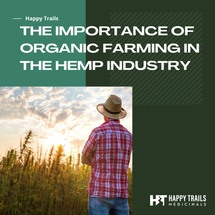Posted by Happy Trails on Oct 18th 2024
The Importance of Organic Farming in the Hemp Industry
The word "organic" has been buzzing around for years, but what does it truly mean? It’s not just a passing trend—it’s still a cornerstone of mindful consumption. At Root Therapeutics, our passion for hemp and plant medicine keeps bringing us back to the same conclusion: organic practices matter. While choosing organic may not always be the easiest or most affordable option, it is undeniably better, especially when it comes to hemp-derived products. Let’s dive into why organic farming is critical and explore the regulations that still leave a lot of grey areas in the industry.
Evolving Hemp Regulations
Hemp regulations have lagged behind those for recreational and medical cannabis for years. The 2018 Agricultural Improvement Act (also known as the Farm Bill) was a game-changer, legalizing hemp nationwide. This legislation opened the door to innovation, but challenges remain. One such issue arose in 2019 when the Environmental Protection Agency (EPA) approved 10 pesticides for hemp production. Just because these pesticides are approved for industrial uses like fiber production doesn’t mean they’re safe for hemp that’s intended for consumption or inhalation.
This regulatory gap highlights the importance of knowing how your hemp is grown. While regulations are designed to protect consumers, they’re not yet comprehensive enough. The reality is that harmful chemicals can slip into products if brands aren't following organic practices, leading to potential health risks when these chemicals become concentrated in oils and tinctures.
Why Organic Matters in Hemp Extraction
One of the biggest dangers in the hemp industry is the concentration of pesticides and contaminants during the extraction process. Hemp, being a bioaccumulator, absorbs everything from the soil. This means any pesticides, heavy metals, or solvents used during its cultivation can end up concentrated in the final oil. As one study noted, the concentration of these contaminants can increase tenfold during the extraction process, especially when non-organic practices are used.
By choosing brands that prioritize organic farming, you’re minimizing exposure to these harmful substances. Organic farming eliminates the use of synthetic pesticides and fertilizers, ensuring a cleaner, purer product. This is especially important when hemp is used to create products for human consumption.
Beware of Diluted Hemp Products
Another risk to look out for is product dilution. There’s no standardized "unit" for hemp extracts like CBD, which means some manufacturers blend contaminated oil with clean oil to skirt around testing standards. This practice can significantly diminish the potency and efficacy of the product. It’s one reason why some hemp products work well for certain people, while others seem ineffective—it’s not just about the hemp, but also about what might be hidden inside.
What to Look for in Hemp Products
With hemp products now available everywhere, from dedicated dispensaries to gas stations, it’s more important than ever to know how to choose wisely. Here are a few key questions to ask when shopping for hemp-based products:
- Can the seller provide a Certificate of Analysis (COA)? This document confirms that the product has been tested by a third-party lab and is free from pesticides, heavy metals, and other contaminants.
- Do they know where the hemp was sourced and how it was grown? Brands that use organic farming practices will proudly share this information. If they don’t mention organic farming, it’s worth looking elsewhere.
- How was the hemp extracted? CO2 extraction is the cleanest and safest method, producing a pure product free from solvents or chemicals that could compromise its quality.
By asking these questions, you can make more informed choices about the hemp products you buy. If the retailer can’t answer them, it might be best to shop elsewhere.
Root Therapeutics' Commitment to Quality
At Root Therapeutics, we live and breathe hemp. Every day, we’re committed to producing the highest-quality hemp products and educating consumers about the importance of organic farming and transparent practices. We want you to feel confident in the products you’re using and to experience their full benefits without worry.
If you have any questions, feel free to reach out to us or even better, set up an appointment with a consultant on staff here. We’re always here to help you navigate the world of hemp and make the best choices for your well-being.
Let’s celebrate natural healing together!
Sources:


